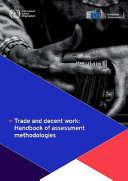
Trade and Decent Work
By - International Labour Organization Research Department
Floor
-
Floor 1
Published
-
ILO, Geneva, 2021
ISBN 10 - 9220347652
ISBN 13 - 9789220347652
Book Status
-
1 Qnty Available with us.
Subject
-
labour market analysis
Shelf No
-
13
Call Number
-
300 TRA
Physical Description
-
xii, 75 p. : ill.